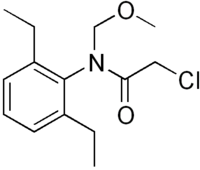Difference between revisions of "Alachlor"
m |
m (References) |
||
| Line 2: | Line 2: | ||
! bgcolor="#FF8888" | Alachlor | ! bgcolor="#FF8888" | Alachlor | ||
|- | |- | ||
| − | | align="center | + | | align="center" bgcolor="#FFFFFF" | [[Image:Alachlor.png|200px|Alachlor]] |
|- | |- | ||
! bgcolor="#8888FF" | Formula | ! bgcolor="#8888FF" | Formula | ||
| Line 14: | Line 14: | ||
The United States Environmental Protection Agency has found alachlor to potentially cause the following health effects when people are exposed to it at levels above the maximum contaminant level (MCL) for relatively short periods of time: slight skin and eye irritation. | The United States Environmental Protection Agency has found alachlor to potentially cause the following health effects when people are exposed to it at levels above the maximum contaminant level (MCL) for relatively short periods of time: slight skin and eye irritation. | ||
| − | Alachlor has the potential to cause the following effects from a lifetime exposure at levels above the MCL: damage to liver, kidney, spleen; lining of nose and eyelids; cancer.<ref>[http://www.epa.gov/safewater/contaminants/dw_contamfs/alachlor.html US EPA Consumer Factsheet]</ref> | + | Alachlor has the potential to cause the following effects from a lifetime exposure at levels above the MCL: damage to liver, kidney, spleen; lining of nose and eyelids; cancer.<ref name="r1">[http://www.epa.gov/safewater/contaminants/dw_contamfs/alachlor.html US EPA Consumer Factsheet]</ref> |
| + | |||
| + | If released to soil, alachlor can be broken down by bacteria and sunlight, usually within two months. However, alachor does not bind to most soils very well and may either evaporate or leach into ground water. Sunlight and bacterial action are also important for degrading alachlor in surface water, but evaporation generally does not occur. Once alachlor enters ground water, its break down is very slow. The bioconcentration of alachlor in aquatic organisms is not important. Any alachlor taken up by plants or animals is quickly eliminated.<ref name="r1"/> | ||
| + | |||
| + | ==References== | ||
| + | <references/> | ||
Revision as of 17:36, 12 July 2007
| Alachlor |
|---|

|
| Formula |
| C14H20ClNO2 |
Alachlor is an herbicide used mainly to control weeds in corn and soybean fields.[1][2] Alachlor is in the chloroacetanilide family of herbicides.
The United States Environmental Protection Agency has found alachlor to potentially cause the following health effects when people are exposed to it at levels above the maximum contaminant level (MCL) for relatively short periods of time: slight skin and eye irritation.
Alachlor has the potential to cause the following effects from a lifetime exposure at levels above the MCL: damage to liver, kidney, spleen; lining of nose and eyelids; cancer.[3]
If released to soil, alachlor can be broken down by bacteria and sunlight, usually within two months. However, alachor does not bind to most soils very well and may either evaporate or leach into ground water. Sunlight and bacterial action are also important for degrading alachlor in surface water, but evaporation generally does not occur. Once alachlor enters ground water, its break down is very slow. The bioconcentration of alachlor in aquatic organisms is not important. Any alachlor taken up by plants or animals is quickly eliminated.[3]